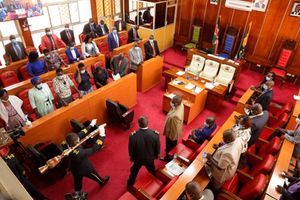
National Treasury and Economic Planning Cabinet Secretary John Mbadi.
Treasury Cabinet Secretary John Mbadi has become the latest minister to clash with MPs over the timely release of the National Government Constituency Development Fund (NG-CDF).
Appearing before Parliament on Wednesday, Mr Mbadi told lawmakers that he remained committed to ensuring that the NG-CDF was released on time because he understood its impact.
"As a former member of this House, having been here for 17 years, I appreciate the role of the CDF, including supporting vulnerable children," Mr Mbadi told MPs.
He told the House that when he assumed office under the broad-based arrangement, there was a Sh13 billion carry-over from NG-CDF for the 2023/24 financial year.
He said the money was added to the Sh57 billion meant for constituencies for the 2024/25 financial year that was to be disbursed.
Mr Mbadi said as at December last year, only Sh13.5 billion had been disbursed to constituencies.
He assured MPs that the National Treasury would disburse another Sh7 billion before the end of this month.
"If there is anything I have promised and haven't done, it's not deliberate. The pressure is just too much," said Mr Mbadi.
However, Mr Mbadi is not the first cabinet secretary to have a protracted run-in with lawmakers over the release of NG-CDF as his predecessors such as Henry Rotich and Njuguna Ndung'u also faced a hostile parliament.
For Mbadi, what has angered MPs is that less than a year ago, he was one of their own in Parliament and understands how the timely release of NG-CDF will go a long way in helping needy students.
The lawmakers' fear stems from the fact that they are about to go on a long recess in two weeks' time and will have to face the needy students with an empty coffer in the CDF.
The move, they say, puts the future of thousands of students who depend on the funds in jeopardy.
Leading the chorus demanding answers from Mbadi was Marakwet East MP Kangongo Bowen, who rallied his colleagues to boycott the afternoon sitting until the NG-CDF issue was addressed with proof from National Treasury that money had been transferred to the accounts.

The House was so united that Speaker Moses Wetang'ula was booed by lawmakers who wanted the Tuesday afternoon session cancelled to send a message to Treasury about the seriousness of the matter.
Mr Wetang'ula was forced to plead with the lawmakers not to walk out, calling it a cowardly act when they hold all the power to make decisions with serious implications for any authority.
"It is extremely cowardly for MPs who have all the constitutional powers to boycott their duties. You have impeached a minister and a deputy president, you have immense power. How can you run away from your own house?" the speaker asked the agitated MPs.
Kitui Central MP Makali Mulu said this year's delay was the worst since he joined parliament 15 years ago.
"I have been in this House for many years and I want to confirm that this is the worst year in terms of NG-CDF disbursement. We even have treasury leadership from this house and yet things are getting worse," Dr Mulu said.
In February last year, MPs threatened to impeach the then finance minister CS Ndung'u over delays in the disbursement of the fund.
Such was the hostility in Parliament that lawmakers paralysed business by staging a walkout during the afternoon sitting to force the release of the money.
During Prof Ndung'u's time, MPs also walked out of the inauguration in Mombasa in January 2023 to protest the delay in releasing the funds.
Between 2018 and 2020, former Treasury CS Henry Rotich was also summoned by the committees over delays in the disbursement of funds.
Some of these sessions were so heated that in 2018, journalists had to be sent out of one of the sessions as MPs 'roasted' the CS.
The fund is disbursed on a quarterly basis, and under the new Constituency Development Act, the amount allocated for bursaries has been increased from 35 per cent to 40 per cent.
The CDF Act, which was enacted in 2003 and later amended in 2007, stipulates that at least 2.5 per cent of the last audited revenue approved by the National Assembly must be set aside by the government for the fund to be used at the constituency level.






